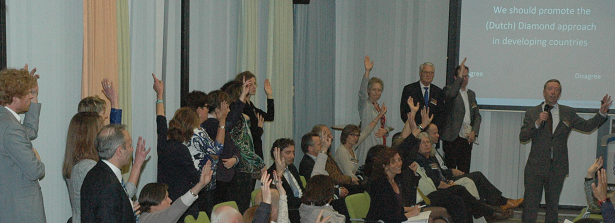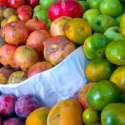Lively event ‘Scaling up Dutch efforts for Global Nutrition’

On March 10, 2015, the Netherlands Working Group on Nutrition (NWGN) organized an action-oriented discussion event entitled ‘Scaling up Dutch efforts for Global Nutrition’. It included the Dutch launch of the Global Nutrition Report 2014 by Lawrence Haddad (International Food Policy Research Institute), a key note speech by Reina Buijs (Ministry of Foreign Affairs, Deputy Director-General for International Cooperation) and a lively ‘House of Commons’ session in which participants debated various options to scale up Dutch efforts towards achieving nutrition security. The report of this event is available here.
Lawrence Haddad emphasized that nutrition should be high on the political agenda and an integral part of the UN Sustainable Development Goals. Closely linked to the obvious health reasons, economic benefits that result from investments in nutrition are evident – for every dollar invested, 16 dollars will be returned. The Global Nutrition Report shows examples of countries and regions that have made spectacular nutrition improvements, for example, the state of Maharashtra in India, where stunting fell from 37 to 24% in 7 years as a result of a combination of quite modest interventions.
The Dutch government aims to improve nutrition via the ‘Diamond Approach’, linking government, private sector, civil society and knowledge institutes. The recent policy letter ‘Food Security Policy’ clearly includes a focus on addressing malnutrition.
During the House of Commons debate there was a joint sense of urgency to end malnutrition, although opinions differed about the priority approaches to use to achieve this. Some said that systemic problems would be overlooked if Dutch actors only focused on the ‘first 1000 days’, while others commented that a focus on the first 1000 days does imply tackling some of the most important underlying causes of malnutrition. Another point leading to diverging views concerned food fortification. Some considered it a ‘far too limited’ approach and said changing the behavior of governments and households was more important. Others argued food fortification did not exclude other interventions, but could ‘buy time’. Improving nutritional outcomes along the agricultural value chain was considered important by many participants. The vast majority agreed that investments from the Dutch government into nutrition should at least triple.
NWGN, in collaboration with the Food & Business Knowledge Platform, the Ministry of Foreign Affairs, and with Unilever serving as the host organization had jointly arranged this event in order to foster the debate surrounding the Dutch ‘Food Security Policy’ letter, and in particular the Nutrition Security agenda within it. In the course of 2015, two other discussion events are anticipated, focusing on specific thematic areas.
Please download the final report of the event ‘Scaling up Dutch efforts for Global Nutrition’.






